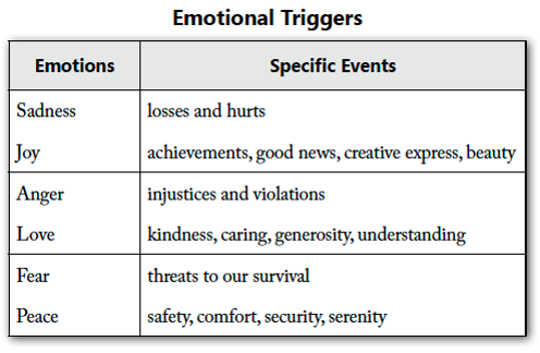
Image by klimkin
Whether you describe the way you feel as jubilant, happy, elated, ecstatic, or euphoric, the underlying emotion is JOY. Joy is an emotion. It's so lovely to feel this emotion and to tell the truth, it's been a while since I've felt it. Joy and other emotions can be elicited by events. I didn't realize the impact our political situation was having on my heart.
As a review, remember that while we can experience tons of different feelings, we only have six emotions, each with their distinct physiology.
Each emotion is triggered by specific events.

The Two Paths to Joy
There are two paths to spark joy, where we'll jump for joy, double over in uncontrollable laughter, or squeal with delight. First, we can engage in activities that feel truly fulfilling. We can do some joy-making activities, such as create amazing art, listen or play inspiring music, participate in healthy exercise, or complete a laborious task. Thrills and robust laughter spontaneously arise from watching the innocence of children and animals, becoming absorbed in any kind of creative project, or winning a prize. Our partner bringing us our morning coffee or hearing truly good news can evoke joy. Dancing, singing, spotting a beautiful bird, running with a loved one through a summer rain, allow our bodies to hum with pure bliss.
The second way we can produce the emotion of joy is by aligning ourselves with the attitudes that have to do with seeing ourselves in a purely positive light. We can create these joy attitudes by using our thoughts, words, and actions, as well as obeying our intuition.
When we experience joy, we naturally possess unshakably high self-esteem. Think about a baby. They are not trashing themselves, but know that there is nothing wrong with them.
We feel worthy, knowing we're okay and perfect as we are. We hold our head high and ride the tide of changing circumstance, like the champion we know we are. Money, or a lack thereof, doesn't make or break us. We stay grounded in the knowledge that we are whole and complete, no matter what. We are self-reliant, not needing to hear that we are okay and lovable from others. We appreciate and respect ourselves unconditionally. And we are proactive and take personal responsibility. On top of all of that, we are curious and marvel at the wonders of the planet and of being alive.
Some Ways to Increase Joy
Here are five easy tips that will get you moving, decrease the amount of sadness you feel, and spark joy:
1. Mobilize more
First and foremost, increase the amount of stimulation you expose yourself to. That might sound easier said than done, as there's so much inertia pulling you horizontal.
Even though it can feel monumental at first, seek new experiences. Select positive and interactive entertainment and activities to contradict the inertia. Reach out to others, and do things you enjoy together. Push yourself to get regular aerobic exercise (or any exercise for that matter). Take a class. Go on a trip. Garden. Visit a friend. Volunteer. Just start by taking little steps each day.
2. Interrupt the constant mental chatter
Interrupt that constant mental chatter that tells you how terrible, small, unworthy, inadequate or unlovable you are, and remind yourself what you know when you're centered and clear.
Many times a day repeat whichever of the following phrases most contradicts your old thinking or make one up along these lines:
"I'm whole and complete. My job is to take care of myself. Life is for learning. We all make mistakes. I am responsible for what I feel, think, say, and do. I love myself. I love me. I can do it."
3. Allow yourself to cry
Allow yourself to cry when you feel sad, but while doing so, refrain from trashing or feeling sorry for yourself.
If you already allow yourself to cry, that's great. If you don't, give yourself permission to. Crying is good. It's natural. It's healthy, especially as a reaction to hurts and losses. So ignore external pressures that tell you to hold it in, and go ahead and cry. However, while you do, it's imperative you don't indulge your "poor me... I'm no good" thinking. Just allow yourself to cry while telling yourself, "I feel sad. It's okay. I just need to cry."
4. Speak up more often about what is true for you
Instead of focusing on what you think others want, need, or believe, ask yourself: "What's true for me?" After you listen within and discover what's true for you, speak it out and translate it into action. It can feel foreign at first to consult yourself for guidance (much less speak up), but as you do, you'll find that you feel more energetic, powerful, and confident.
5. Lifestyle choices
In terms of lifestyle choices, stay warm and dry especially on damp, rainy, and cold days. Don't overeat - or at least try to minimize large heavy meals, especially in the evening. Avoid oily foods, such as nuts and fried foods, reduce dairy products, and strive to eliminate sweets.
Implementing some of these simple suggestions, just a tiny bit each day, and much to your amazement, you'll find yourself experiencing more joy.
Q & A:
How can I handle it when someone makes annoying or inappropriate comments?
I often hear clients voice versions of these common complaints: "My mother-in-law can't help but give me advice," or "My know-it-all sister is sure she has the definite opinion about politics," or "My nosy friend asks pointed questions about my job/relationship/finances."
Here are seven ways to deal with people who are rude, critical, controlling, or insensitive.
1. Matador their comments
A good way to stop a bull that's charging at you, regardless of the negative form it takes, is to just let it go by. Ignore the comments or as needed, fend them off with a simple statement such as, "Thanks, but I'm not looking for advice right now." If the person continues, lovingly say it again. And again, if necessary!
2. Practice acceptance
Accept that people and things are the way they are. You can't change others, but you can change your own perceptions and expectations. If you're coming in to work every day and feeling your stomach clench up as soon as you hear the annoying person's voice across the room, you need to learn how to repeat this phrase over and over until it sinks in: "People and things are the way they are. I can't control them, but I can control my own attitude."
This phrase, which you can customize by putting in the name of the jerky person, works like magic to immediately dispel frustration and remove your emotional involvement with him or her. You'll quickly feel more accepting, calm, and less irritated.
3. Firmly, but lovingly, speak up and stand your ground
Sometimes, especially with particularly pushy people, it's necessary to tell them it's not helpful for you to receive unsolicited advice. Talk about yourself and the specific comment rather than finger-pointing or telling them what a drag they are. Lovingly say your "I" (what's true for you) about the specific event. If they persist, tell them that you're starting to feel angry or frustrated and you'd like them to stop, please. Repeat and repeat some more.
4. Realize that it's not about you
When people feel compelled to tell you what you should do, it's good to remember that what they're saying and what's unconsciously motivating them has little to do with you. They may need to feel important. They may be looking for love or respect from you or others. The reality is that you are fine. They have unexpressed anger and are targeting it on you.
5. Appreciate them when they're not annoying
If you notice that a critical or pushy person is being empathetic or listening with sensitivity, catch them being good. Keep your eye open for good work, smart ideas, or even the occasional good attitude, and be sure to praise them when they do something well. Praising what you do like may subtly sink in and help to change his or her behavior.
6. Focus on keeping the present joyful
Keep bringing the focus back to the present when others attempt to divert attention to negative things and old unfinished business. Make a comment about how good the food is, the football game is, or how beautiful the house looks. Make a genuine comment about the true meaning of the holiday and how grateful you feel.
7. Let out those pent-up emotions
After a long day of fending off critical, over-controlling relatives who've tested the boundaries of your patience and politeness, you need to get all that anger and possibly sadness out of your system. Find a private place to pound your fists, stomp your feet, growl, and cry. You'll feel better instantly, and ready to face them tomorrow!
©2020 by Jude Bijou, M.A., M.F.T.
All Rights Reserved.
Book by this Author
Attitude Reconstruction: A Blueprint for Building a Better Life
by Jude Bijou, M.A., M.F.T.
 With practical tools, real-life examples, and everyday solutions for thirty-three destructive attitudes, Attitude Reconstruction can help you stop settling for sadness, anger, and fear, and infuse your life with love, peace, and joy.
With practical tools, real-life examples, and everyday solutions for thirty-three destructive attitudes, Attitude Reconstruction can help you stop settling for sadness, anger, and fear, and infuse your life with love, peace, and joy.
For more info and/or to order this book, click here.
About the Author
 Jude Bijou is a licensed marriage and family therapist (MFT), an educator in Santa Barbara, California and the author of Attitude Reconstruction: A Blueprint for Building a Better Life. In 1982, Jude launched a private psychotherapy practice and started working with individuals, couples, and groups. She also began teaching communication courses through Santa Barbara City College Adult Education. Visit her website at AttitudeReconstruction.com/
Jude Bijou is a licensed marriage and family therapist (MFT), an educator in Santa Barbara, California and the author of Attitude Reconstruction: A Blueprint for Building a Better Life. In 1982, Jude launched a private psychotherapy practice and started working with individuals, couples, and groups. She also began teaching communication courses through Santa Barbara City College Adult Education. Visit her website at AttitudeReconstruction.com/
Watch an interview with Jude Bijou: How to Experience More Joy, Love and Peace




























